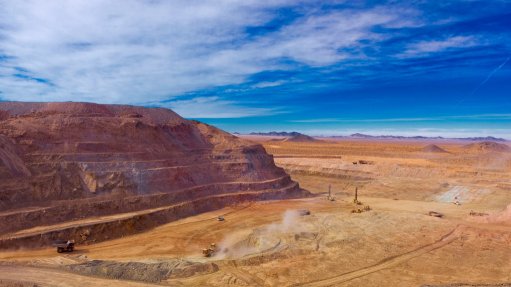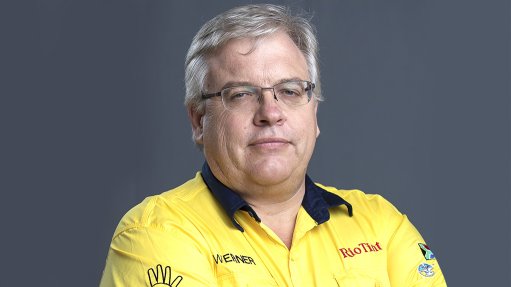Greening focus



REINHARDT ARP Sustainable and responsible mining plays a key role in Africa’s energy transition in terms of ensuring a just transition to sustainable mining, and contributing to the broader just transition
PANEL SPEAKER Lawton-Misra will participate in a panel discussion on whether mining can be “nature positive”, which forms part of the broader sustainability series at this year’s Investing in African Mining Indaba
Amid increasing emphasis on tackling climate change globally, mining companies have had to reassess their operational strategies to ensure the value-add of their sustainability objectives and outcomes, and enhance the equitability and justness of their mining practices, says global climate consultancy Carbon Trust associate director and transition advisory lead Renata Lawton-Misra and associate Reinhardt Arp.
Taking into consideration Africa’s vulnerability to the impact of climate change and the continent’s exposure to international transition risks, they argue that a just energy transition (JET) is critical for enabling sustainable economic development across Africa.
Therefore, sustainable and responsible mining plays a key role in Africa’s energy transition in terms of ensuring a just transition to sustainable mining, and in contributing to the broader JET.
To assist in adopting sustainable mining practices, the Carbon Trust has been supporting the delivery of disruptive technologies for several years, including the development of an offshore wind accelerator programme.
The climate consultancy provides guidance for miners and investors regarding innovative technologies for sustainable mining practices, appropriate sustainability targets and strategies for reducing the environmental impact of mining operations.
It also assists with understanding the low carbon technologies applicable for integration into mining processes as reflected in the International Finance Corporation Net Zero Mining Roadmap for Copper and Nickel Value Chains.
The Carbon Trust, thus, aims to encourage open dialogue among key mining stakeholders regarding the evaluation of decarbonisation efforts and alignment with keeping global warming below 1.5 °C above temperatures experienced in the pre-industrial era.
This is especially relevant as demand for critical minerals from Africa is expected to increase significantly by 2050.
To this end, the climate consultancy aims to partner with leaders in business and society to tackle their most important carbon and climate challenges, and deliver impactful solutions.
In light of a global emphasis on sustainability, Lawton-Misra will participate in a panel discussion on whether mining can be “nature positive”, which forms part of the broader sustainability series at this year’s Investing in African Mining Indaba.
“We believe that the Indaba’s sustainability series agenda will help kindle key discussions towards driving positive disruption across the African mining sector to not only mitigate climate change, but also build the industry’s resilience to physical and transition risks,” say Lawton-Misra and Arp, adding that discussions about the circular economy in mining have been highlighted on this agenda.
Lawton-Misra and Arp note, however, that there are various misconceptions about circular opportunities in mining.
While sustainable mining practices are doubtless becoming more necessary, there are still several challenges that hinder the successful embrace of positive disruptions for the African mining industry, they point out.
These range from governance, policy uncertainty, critical infrastructure limitations and critical skills shortages, to limited access to finance for deploying innovative solutions for sustainable and responsible mining.
Hence, Lawton-Misra and Arp argue that multistakeholder collaboration is critical to address these challenges.
Article Enquiry
Email Article
Save Article
Feedback
To advertise email advertising@creamermedia.co.za or click here
Announcements
What's On
Subscribe to improve your user experience...
Option 1 (equivalent of R125 a month):
Receive a weekly copy of Creamer Media's Engineering News & Mining Weekly magazine
(print copy for those in South Africa and e-magazine for those outside of South Africa)
Receive daily email newsletters
Access to full search results
Access archive of magazine back copies
Access to Projects in Progress
Access to ONE Research Report of your choice in PDF format
Option 2 (equivalent of R375 a month):
All benefits from Option 1
PLUS
Access to Creamer Media's Research Channel Africa for ALL Research Reports, in PDF format, on various industrial and mining sectors
including Electricity; Water; Energy Transition; Hydrogen; Roads, Rail and Ports; Coal; Gold; Platinum; Battery Metals; etc.
Already a subscriber?
Forgotten your password?
Receive weekly copy of Creamer Media's Engineering News & Mining Weekly magazine (print copy for those in South Africa and e-magazine for those outside of South Africa)
➕
Recieve daily email newsletters
➕
Access to full search results
➕
Access archive of magazine back copies
➕
Access to Projects in Progress
➕
Access to ONE Research Report of your choice in PDF format
RESEARCH CHANNEL AFRICA
R4500 (equivalent of R375 a month)
SUBSCRIBEAll benefits from Option 1
➕
Access to Creamer Media's Research Channel Africa for ALL Research Reports on various industrial and mining sectors, in PDF format, including on:
Electricity
➕
Water
➕
Energy Transition
➕
Hydrogen
➕
Roads, Rail and Ports
➕
Coal
➕
Gold
➕
Platinum
➕
Battery Metals
➕
etc.
Receive all benefits from Option 1 or Option 2 delivered to numerous people at your company
➕
Multiple User names and Passwords for simultaneous log-ins
➕
Intranet integration access to all in your organisation




















